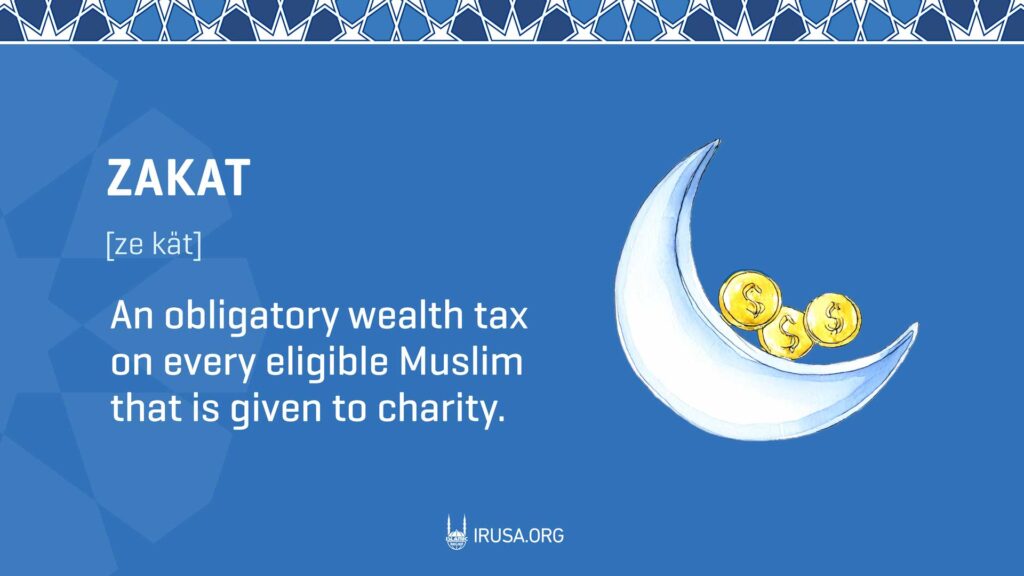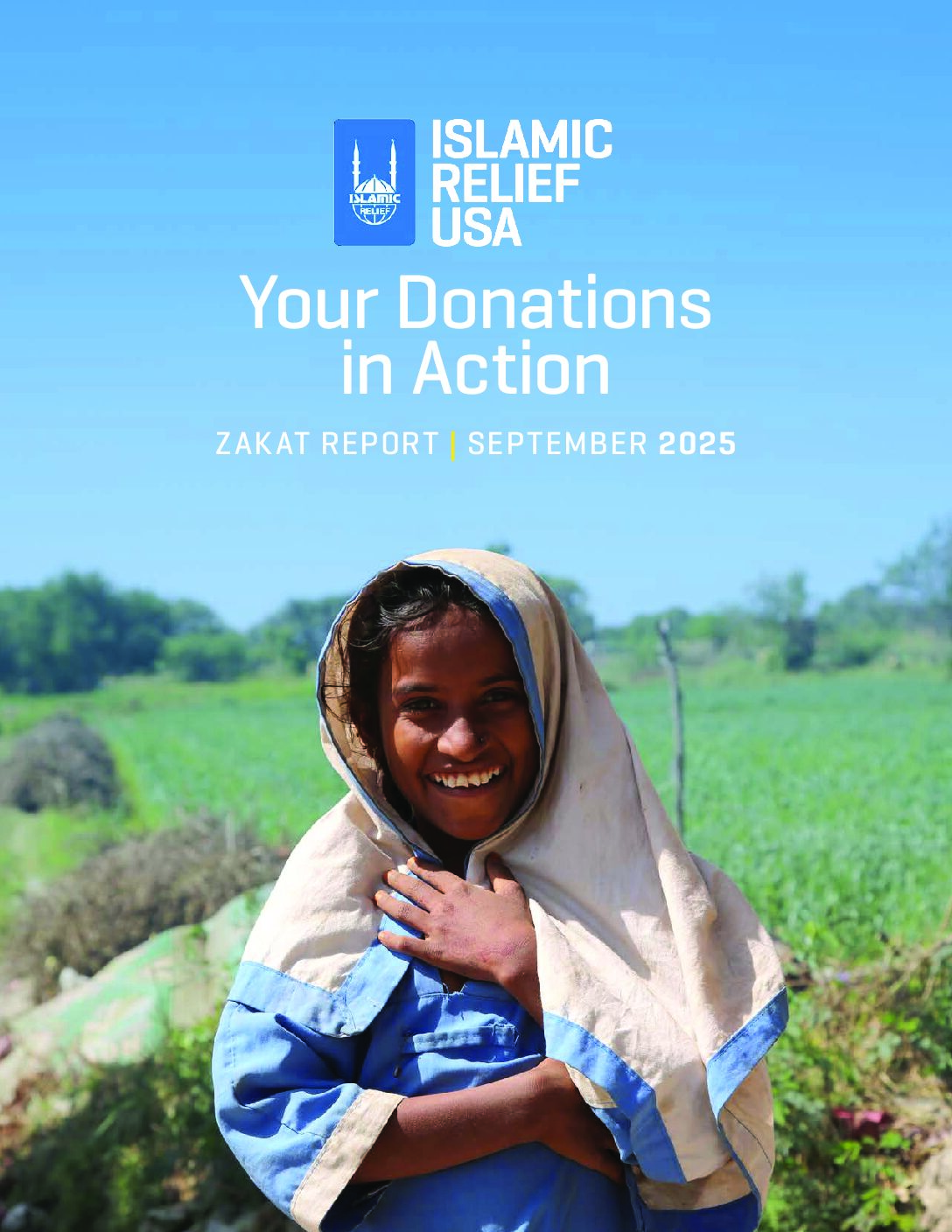
The Power of Zakat
Zakat, or almsgiving, is an obligatory wealth tax on every eligible Muslim and one of the five pillars of Islam. For every sane, adult Muslim who owns wealth over a certain amount, also known as the nisab, he or she must pay 2.5% of that wealth towards Zakat. When you give your Zakat through IRUSA, its powerful, impactful, and its potential grows by multiples. Your Zakat can help provide:
- Food aid
- Access to healthcare
- Sustainable livelihood opportunities
- Refugee aid including emergency shelter
- and much, much more — all in accordance with Islamic principles
2025 IRUSA | Zakat Catalog Book
Zakat is the most-supported fund by IRUSA donors, alhamdulillah, and that speaks volumes for the power of this kind of charity. Take a look at the impact of your Zakat!
Our Dedication to Distributing Zakat
IRUSA collects and distributes Zakat to those who are most in need, in accordance with Islamic guidelines. According to the Holy Qur’an (9:60), there are eight categories of people who qualify to be recipients of Zakat:
- The poor
- The needy
- The collectors of Zakat (IRUSA is an example)
- Those whose hearts are to be won over
- Captives
- Those burdened with debt
- In the cause of Allah (SWT)
- Travelers
Most scholars agree that the poor and needy are the most important categories of people to receive Zakat. Given that, it is acceptable to give your entire Zakat allotment to individuals who are in those groups.
While many prefer to give Zakat al-Mal during Ramadan, the option to give is always open. However, when it comes to Zakat al-Fitr, it should be given before Eid prayer.
Scholar-Verified Zakat Policy
With our commitment to collecting and distributing Zakat honestly and ethically, in accordance with Sharia, IRUSA has enlisted the expertise of some of the leading and most-respected Muslim scholars in the US to form an independent Zakat Advisory Board to review, develop, and uphold Islamic Relief USA’s Zakat Policy.
We believe this is paramount to fulfilling our organizational values, such as Ihsan (excellence) and Amana (custodianship).
In 2023, the board ratified IRUSA’s Zakat Policy, and will continue to provide independent reviews, oversight, feedback, and verification of the distribution of Zakat by IRUSA. The Zakat Advisory Board scholars, however, are not responsible for the implementation of the IRUSA Zakat Policy — that is the sole responsibility of IRUSA.
Empowering Communities: The Transformative Potential and Practices of Zakat in the Contemporary United States – Insights from Scholars, Theologians, Practitioners, and Community Leaders
Islamic Relief USA & MPI hosted the Zakat Symposium (Nov. 18–19, 2024, Alexandria, VA), convening scholars under Chatham House Rules to discuss U.S. Zakat distribution debates, including recipient eligibility for non-Muslims. A white paper outlines six key insights to foster consensus.
Zakat FAQs
IRUSA consults with a Zakat Advisory Board for information about religious donations. It is advised that you consult with your local imam or scholar for more detailed inquiries.
You can use our Zakat calculator to calculate how much you need to give.
Here’s some FAQs that may help you calculate your Zakat:
What is Zakat?
In Arabic, Zakat means purification, growth and blessing. It is a charitable practice that requires all able Muslims (those who meet the requirement of Zakat as dependent upon nisab and hawl—see below) to contribute a fixed portion of their wealth – 2.5% of savings — to help the needy.
What is the nisab & hawl?
Nisab is the minimum amount of wealth a Muslim must have—after calculating necessary expenses—to be eligible to contribute Zakat. Nisab is equivalent to the current value of 3 ounces of gold (or 85 grams of 24k gold). The nisab we’ve calculated for our Zakat calculator is based on the most-recent report available to us (disclaimer: this number may change daily depending on fluctuations in the gold exchange rate).
Hawl is defined as the completion period for a Zakat asset, which is one lunar year. In other words, the wealth on which Zakat should be paid must have been held for at least one full year. There are some forms of Zakat that do not require hawl, such as for crops, when Zakat should be paid at the time of the harvest. For clarification, it is recommended that you consult with your local imam or scholar.
My wealth dipped below the nisab during the course of the year - do I still have to pay Zakat?
Yes, but refer to your local imam or preferred scholar for more details.
Who is obligated to pay Zakat?
Every adult Muslim who meets the requirements of nisab and hawl in a calendar year must pay Zakat for that year. There are some conditions that may require others, a wali (guardian) of a minor for instance, to pay Zakat too. As always, it is best to consult with your local imam or scholar for clarification.
Must I have the intention to pay Zakat for it to be accepted?
Yes. In Islam, intention is an essential part of any act of worship, including the payment of Zakat. The intention must be made at the time the Zakat is paid.
What kinds of wealth are included in the calculation of Zakat?
For a detailed list of wealth to include, please see IRUSA’s Zakat calculator.
These stipulations delineate the type of wealth that should be accounted for when calculating Zakat:
- The wealth is yours and under your control. You do not need to include outstanding debts when calculating Zakat.
- The wealth is subject to development and increasing.
- After calculating necessary expenses, the wealth meets the requirements of nisab.
- Personal belongings, such as clothes, primary homes, food, cars, are exempt from Zakat.
What is the administrative cost on Zakat donations?
IRUSA follows the practice agreed upon by most scholars, which states that collectors of Zakat are one of the eight groups that are eligible to receive Zakat. As an administrator of Zakat, IRUSA is eligible to receive a portion of your Zakat donation in order to serve those in need.
So, here is how donations made to Zakat-specific funds break down:
- As an administrator of Zakat, IRUSA is eligible to receive a portion of your Zakat donation in order to serve those in need. So, here is how your Zakat donation breaks down:
- 80% is used to implement programs serving our rights holders.
- 20% is used to cover administrative fees for IRUSA and our implementing partner(s).
Does this mean that 100% of your Zakat donation gets used in Zakat-eligible ways? YES!
To learn more about this, read IRUSA’s Zakat Policy.
Do I have to pay my Zakat on my home?
One does not have to pay Zakat on a primary place of residence. If the house qualifies as a secondary residence that sometimes get rented out, however, Zakat is due on it after subtracting necessary expenses from the income generated.
Do I have to pay my Zakat on jewelry?
Yes, on jewelry you do not regularly wear and that you own for investment purposes.
Do I have to pay my Zakat on stocks?
Yes. You may use the current value on stocks.
What is the difference between Zakat and sadaqah?
In the language of the Holy Qur’an, Zakat and sadaqah are the same. In practice, however, sadaqah is the term used to indicate voluntary charitable giving while Zakat is obligatory.
What is the difference between Zakat and Zakat al-Fitr?
Zakat al-Mal (commonly called “Zakat“) is due when a person’s wealth reaches the nisab amount and can be paid anytime during the year. Zakat al-Fitr is paid by the head of the household for each member of the family, before Eid al-Fitr prayer.
What do you mean when you say Islamic Relief USA acts as an agent and how does this allow me to pay my Zakat al-Fitr in money?
An agent is someone who facilitates the payment of your Zakat al-Fitr because they are better placed to distribute the food on your behalf. You can pay the agent (in this case, IRUSA) in money because the agent uses that money to buy the food which is then given to appropriate beneficiaries. So, in reality, it is as if you are paying in food rather than in money.
On whose behalf do I have to pay Zakat al-Fitr? What if I have young children?
Zakat al-Fitr should be paid on behalf of everyone in the family. There are some scholars that recommend that Zakat al-Fitr is also paid on behalf of unborn children after the 120th day of pregnancy, but do not view it as obligatory. Most scholars do agree, however, that Zakat al-Fitr should be paid on behalf of the baby after his/her birth. Please do consult with your local imam or scholar for further clarification.
When should I pay my Zakat al-Fitr?
It should be paid before Eid prayer (or any day during Ramadan). There are some schools of thought that also allow for Zakat al-Fitr to be paid even before Ramadan. Consult with your local imam or scholar if you need additional information.

